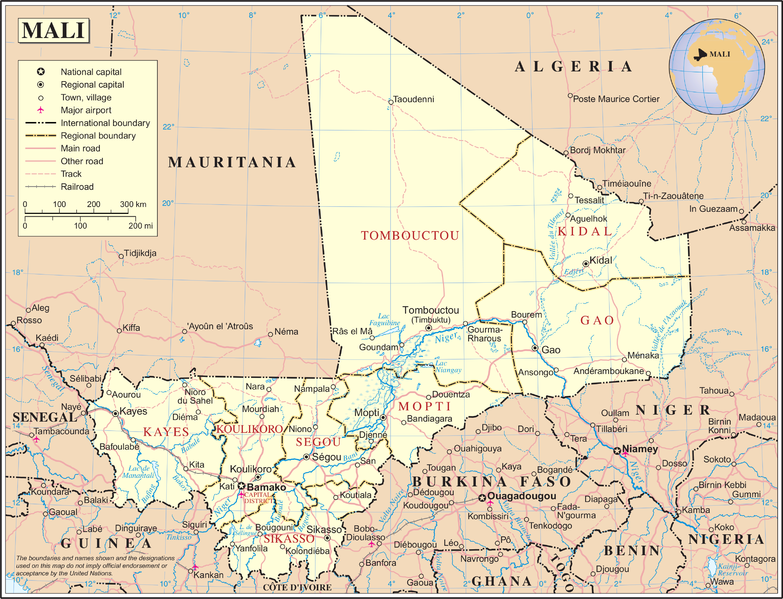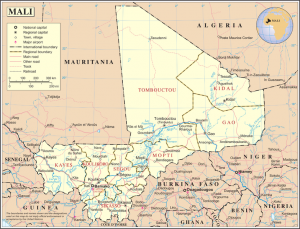
Mali and the burgeoning terror threat in North Africa
 The March 21st coup d’etat in Mali, a symbol of democracy in West Africa for twenty years, prompted a swift response from the international community. This response has been driven predominantly by concerns that the nation could become the newest hub of Islamist terrorism in northern Africa, where extremism is already rapidly proliferating.
The March 21st coup d’etat in Mali, a symbol of democracy in West Africa for twenty years, prompted a swift response from the international community. This response has been driven predominantly by concerns that the nation could become the newest hub of Islamist terrorism in northern Africa, where extremism is already rapidly proliferating.
Mali’s military coup was executed under the pretense of ending President Amadou Toumani Touré’s “incompetent rule” and with the intent to return the nation to a democratic civilian government. Despite immediately being suspended from the African Union, the military junta only recently returned the country to civilian rule, but has failed to regain control of its northern region. Now, ECOWAS has lost patience with the interim government’s dawdling and, along with French support, has called for UN intervention in Mali.
The international response has thus far been one of the most proactive, and is aimed at preventing the proliferation of terrorism in a high-risk environment where a threat is already established.
Current conditions in Mali provide an ideal environment for terrorist activity: an absence of political and legal frameworks, expanses of ungoverned land, and Islamist-friendly militants. The MNLA (Azawad National Liberation Movement, a Tuareg rebel-led group), Ansar Dine, and AQIM (al-Qaeda in the Islamic Maghreb), operate almost unimpeded from Mali’s northern region and have been behind anti-government attacks, kidnappings, and drug-running.
Since its condemnation of the coup, the US has maintained a safe distance from the situation in Mali when in fact it should be taking an intense interest in events on the ground. Embedded in the fallout from the coup, is an opportunity for the US to learn from the consequences of its actions and act preemptively in the interest of its national security.
First, in an example of unanticipated consequences, there are linkages between the Libyan intervention and Mali’s coup. Malian combatants fighting in Libya on behalf of Moammar Qaddafi returned to Mali having obtained experience and firepower from the conflict. These combatants formed MNLA and seized territory in the north of the country in early 2012. The situation exacerbated a general malaise within the Malian army which, after realizing it was inadequately prepared to fight the rebel forces, mutinied against the government. What began a mutiny ended a coup, and Mali’s north is now subject extremist influence.
Second – and most importantly – the US has an opportunity to act proactively in preventing extremism from becoming further entrenched in Africa. While sub-state terrorism has long been widespread, the spread of Islamist terrorism throughout northern Africa is gathering momentum as organizations relocate operations from Pakistan and East Africa on account of US drone strikes and local or regional actors seek alliances with larger organizations. AQIM in the Sahel region, Boko Haram in Nigeria, and al-Shabaab in Somalia – already in the crosshairs of US drones – all threaten US interests and national security.
The US can capitalize on the situation in Mali and expand its counterterrorism efforts by increasing its strategic engagement with African countries affected by terrorism, renewing public diplomacy efforts throughout Africa, and understanding the development of a new threat from the implementation of the Libyan intervention.
Direct US strategic engagement with African nations has generally been limited to protecting access to energy resources and counterterrorism activities. AFRICOM has released its 2012 Posture Statement which focuses on counterterrorism, reducing piracy and illicit trafficking, and building defense and crisis response capabilities. AFRICOM is focusing on the right issues; what matters is that these initiatives are implemented in a meaningful and effective way on the local and regional levels where engagement is most needed.
This increased strategic engagement must be coupled with renewed public diplomacy efforts to bolster positive perceptions of the US and rally support behind counterterrorism efforts. For the first time during the Obama Administration, the public approval of the US and US leadership capabilities has declined in Africa. Declining public support for the US puts at risk any US-led efforts to counteract the terrorist threat present in the region. A public diplomacy campaign aimed at articulating US objectives in counterterrorism efforts and how key government and civil society actors in Africa can lend support increases the efficacy of US and global efforts to stamp out the terrorist threat.
Finally, the US must understand that the intervention in Libya produced consequences in Mali that have international implications. These consequences might have been prevented with longer-term thinking and better intelligence on national and sub-national issues in the region. Understanding these issues could have produced a strategy that took into account the likelihood that a strategic intervention in Libya would either relocate the target issue or spawn an entirely new problem in another location.
This inability to plan for second- and third-order consequences is consistently reflected in US strategy but is essential to achieving US objectives. Until the US is able to approach strategic challenges such as the threat of extremism in Mali from a long-term perspective, its efforts are likely to be temporary fixes to an enduring problem.





